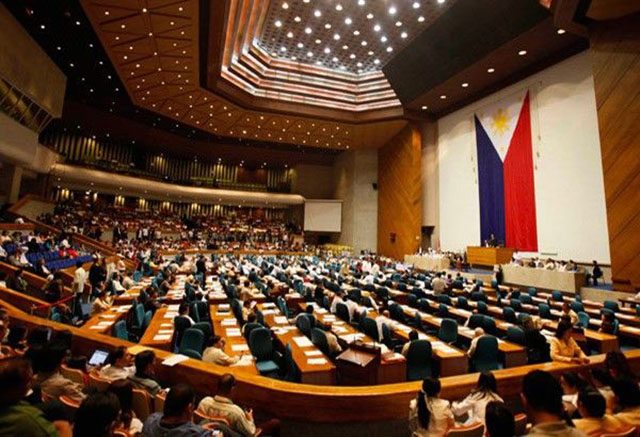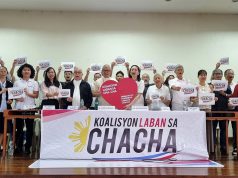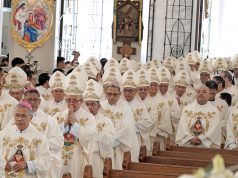An online petition addressed to the House of Representatives sought to junk the proposed measure against terrorism because some of its provisions were deemed unconstitutional and would trample on basic civil liberties.
On May 29, the House committees on Public Order and Safety, and on National Defense and Security adopted the Senate’s version of the anti-terror bill or Senate Bill No. 1083, which has been approved on third and final reading last February.
This, amid the community quarantine measures in place in most parts of the country.
The joint committee voted 34 to 2 in favor of approving the Anti-Terrorism Act of 2020, therefore removing the provisions the House proposed for their version.
Only Rep. Carlos Zarate (Bayan Muna Party-list) and Rep. Jose Cristopher “Kit” Belmonte (Quezon City 6th District), both deputy minority leaders, opposed the bill.
During the last Senate deliberations into the same measure, only opposition Senators Risa Hontiveros and Francis Pangilinan dissented.
The Senate Bill No. 1083 seeks to amend and repeal the Human Security Act of 2007 or Republic Act 9372, the country’s existing legislation against terrorism.
Sen. Panfilo Lacson, who sponsored the Senate bill, earlier said that the HSA did “virtually nothing” to prevent terrorist plots and actions in the country.
Signature campaign
As the measure progressed despite public dissent last February, an online petition via Change.org from a Facebook page called Defend UPLB titled “Junk the anti-terrorism bill and uphold human rights!” made rounds on Twitter and Facebook.
This isn’t about blm but even though u aren’t from the Philippines i hope i could borrow your time to help us complete our goal. Our government is trying to silence us by taking our freedom of speech. Please sign this and spread. https://t.co/GEVYAAhg4u
— krista⁷₁₃ blm (@daintyjimn) May 30, 2020
As of writing, the online plea has collected 93,510 online signatures out of the target 150,000.
In the campaign, the Defend UPLB introduced itself as “an alliance of all student councils, allied institutions, and member-organizations based in UPLB in forwarding Academic Freedom, Civil Liberties and Human Rights.”
It enumerated four main consequences that will happen should the Anti-Terrorism Bill be signed into law.
These are the similar issues several groups raised when the Senate approved the bill.
Vague definition of terrorists and terrorist organizations
“There is an over-broad definition of ‘terrorism’ which could blatantly tag political activities, mass mobilizations, and major protests of progressive formations as ‘terrorist acts’ through a hasty ‘terror-tagging’, particular with its economic and political consequences.”
In the proposed measure’s definition of terms, a terrorist individual is “any natural person who commits any of the acts defined and penalized” specified in its provisions.
A terrorist organization, meanwhile, refers to “any entity organized for the purpose of engaging in terrorism, or those proscribed under Section 26 hereof or the United Nations Security Council-designated terrorist organization.”
Silencing any form of dissent
The group also argued that the defined terrorist acts in the bill silence criticisms on the state’s credibility and expose the government’s insincerity to do its job in serving and protecting the people.
“Under this law, press freedom is a terrorist act,” the petition read.
Chel Diokno, chairman of the Free Legal Assistance Group, noted on the provision “inciting to terrorism” that has similar definitions as the acts of “inciting to sedition” and “inciting to rebellion.”
“Inciting to terrorism, however, is susceptible of broad application. Posible ngang gamitin ito para habulin ang mga kritiko ng administrasyon, just like this administration and previous administrations have used inciting to sedition to go after critics of the administration,” Diokno said.
Violates the Philippine constitution.
“Under this law, the security and presumption of innocence of the suspects until proven guilty are endangered.”
This is stated in Section 29 of the measure, wherein, “the arrest or detention of a person suspected of committing terrorist acts without a judicial warrant” is permitted.
A clear violation of the right to privacy
In Section 16 of the bill, military personnel or law enforcement agent with a written order from the Court of Appeals has the authority to secretly intercept and wiretap suspected individuals as part of their surveillance.
Rep. Sarah Elago (Kabataan Party-list) argued on Twitter that the bill provided no safeguards to protect basic human rights and redress of grievances.
“It has no safeguards for the protection of human rights, redress of grievances. This can be weaponized to silence critics, suppress dissent,” Elago said.
Online posts against the terror bill
The hashtag #Junkterrorbill and #OustDuterte trended on Twitter over the weekend following the Lower House’s decision.

Some Twitter users, meanwhile, shared infographics to explain to their followers how ordinary Filipinos will be affected by the provisions of the bill.
ACTIVISM IS NOT TERRORISM. our heroes spent decades fighting this country's democracy yet this government is removing the right of freedom of speech. criminalizing criticism. this is not what we need during this pandemic. #JunkTerrorBill #OUSTDUTERTENOW pic.twitter.com/wTduR2WE0v
— ash ⁷ | #BlackLivesMatter. #JunkTerrorBill. (@taechubsi) May 29, 2020
there's an ENG translation of these infographics now for non-filos, please help us spread awareness on this #JUNKTERRORBILLNOW https://t.co/DVc7vPku4N pic.twitter.com/D8xi4yruAS
— elle⁷ #OustDuterte #blm (@rkiveksj) May 31, 2020
A Facebook meme page shared a screenshot of Section 4 of Article III Bill of Rights of the 1987 Constitution which grants Filipinos’ rights of freedom of speech and expression.
KNOW YOUR RIGHTS!#JunkTerrorBill
Posted by Bobong .Tayuman Memes on Friday, May 29, 2020










